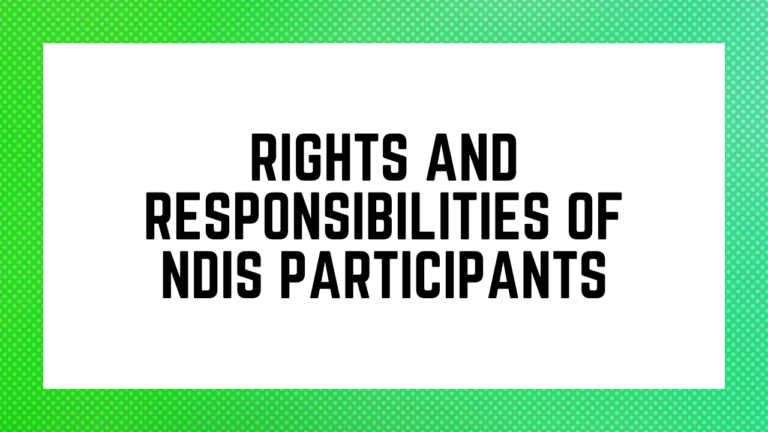
People with disabilities throughout Australia receive in-home aged care services under the NDIS plan. If you are an eligible NDIS participant, it is obvious that your illness, post-surgery needs, or challenging behaviour is making you receive comprehensive disability services at home. However not knowing your NDIS Participants rights and responsibilities before receiving home care from disability support providers can create misunderstandings in service qualities and conditions.
For this reason, this blog will guide you through all the rights and responsibilities that you must know when receiving home care disability services. The purpose of this blog is to educate you about your freedom and duties so that you save yourself from getting poor services.
Rights of NDIS Participants
As you are eligible for NDIS home care assistance, understanding your rights before choosing a provider can make your decision clear.
1. Choice and Control:
You have the right to choose and control the support and services you will be receiving under home care. With the right to choose, you can select disability support providers on your own or get recommendations from NDIS planner and then choose the best carer.
And with the right to control, you can determine how support will be delivered, the types of services, frequency, and level of care. You do not have to choose just one provider for all your supports.
2. Right to Respect:
Next, you have the right to receive services with respect. Your provider must honour your preferences, cultural background, and privacy during the times of you receiving the disability support and even after it. It is important to have registered providers who follow NDIS Code of Conduct and conduct respectful behaviour, especially when your disability impacts your behaviour.
3. Safe and High-Quality Supports:
You also have the freedom to get safe and high-quality assistance. NDIS home care agencies complying with NDIS practice standards make sure that participants feel safe, both physically, emotionally, and mentally. This regulation also states that you have the right to deny services if the provider’s approaches turn into exploitation and neglecting behaviour.
In addition to this, you have the power to receive only quality services that best match with your goals. If you find that you are compromising, NDIS Quality and Safeguards Commission provides a forum where you can file a complaint against your NDIS provider or switch the provider.
4. Access to Information:
Access to NDIS plans, including the available support and their funding is important. You get the privilege to get an accessible and simple NDIS plan. Along with this, you also have the right to understand your service agreements, conditions, and regulations that tie you with your provider till the end of NDIS plan.
You can ask for all the NDIS information related to your disability with the NDIS planner or home care agencies directly. Or, you can access this information through the MyPlace portal on the NDIS website.
5. Right to Provide Only Relevant Personal Information:
You have the freedom to decide what personal information you want your NDIS provider should know or not know. It is best to stay alert at all times and provide your personal details only if it is an absolute necessity for treating your disabilities under home care.
Responsibilities of NDIS Participants
It is important to know your duties before or while receiving home care assistance to make better choices.
1. Manage Your Plan:
If you are opting for self management, you are responsible to track every support, spendings, and paying the invoices on time. You must also keep records of pay slips, statements, and invoices to provide evidence when giving feedback or tracking expenses. At times, you must also review the NDIS plan with home care agencies to ensure the optimal funding.
But if you are choosing a plan-managed or agency-managed funding, then you are responsible to see if your plan manager or NDIS planner meets NDIS pricing guidelines.
2. Use Funds Appropriately:
You must use NDIS funding appropriately, ensuring that supports and services you are buying are directly related to their disability and align with your NDIS plan goals. Misuse of funds can result in penalties.
3. Communicate with Providers:
Effective communication with service providers is crucial. Participants should clearly express preferences, provide feedback, and address any issues. If you need some changes in your current service agreements, you must discuss these with providers and follow the process.
4. Report Issues:
You are additionally responsible for raising complaints that you have with your current provider, contact the NDIS Quality and Safeguards Commission, or seek help from local area coordinators (LAC).
Final Words
We hope you found this blog useful. Understanding your rights and responsibilities as an NDIS participant is essential for receiving the best care and support. Remember, home care disability support providers and their support will always guide you through and advocate for your needs.
NDIS is a right for every NDIS participant and this guide must help you to fulfil your goals without any burden or unfulfilling promises. Take the next step — find home care agencies today!